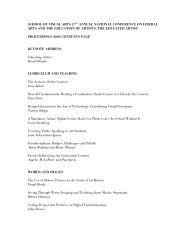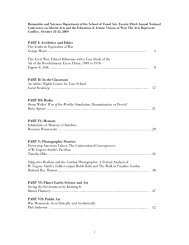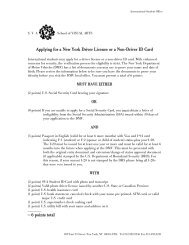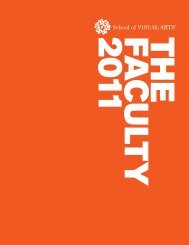SECTION 1 - via - School of Visual Arts
SECTION 1 - via - School of Visual Arts
SECTION 1 - via - School of Visual Arts
Create successful ePaper yourself
Turn your PDF publications into a flip-book with our unique Google optimized e-Paper software.
There are those who would dismiss such thinking as absolutist. They would quickly point out<br />
that wisdom, goodness, and genuineness are relative terms and that democratic peoples should<br />
do all in their power to resist the imposition <strong>of</strong> such absolutes on education. And so they<br />
should. But that is not what is being advocated here. This effort is not saying that wisdom,<br />
goodness, and genuineness are commodities that can or should be imposed on anyone, least <strong>of</strong><br />
all future teachers. What is being advanced here is the simple notion that the uncivilizing<br />
existential vacuum can be avoided through a dialogue between colleges <strong>of</strong> education and their<br />
students concerning ideals such as wisdom, goodness, genuineness, justice, and beauty (to<br />
name a few) that are to be found only in the fine arts and humanities Further, it advances the<br />
notion that these dialogues must take place if future teachers are to be able to continue the<br />
dialogue concerning such ideas with his /her own future elementary or secondary students<br />
(which surely must minimally at least be a better place to begin necessary changes).<br />
The intent here is not to use colleges <strong>of</strong> education to attempt to impose ideals such as wisdom<br />
and goodness on its students. Nor is it the intent to even try to use colleges <strong>of</strong> education to<br />
attempt to define such ideals for its students. The plan suggested here is an attempt by colleges<br />
<strong>of</strong> education, through the fine arts and humanities, to convene and conduct a dialogue with its<br />
students to simply discuss these ideals. The goal <strong>of</strong> such a plan is not to discover to everyone’s<br />
satisfaction a commodity labeled wisdom or beauty or truth. In a pluralistic society this may not<br />
even be possible. Wisdom and other such ideals are illusive when we try to treat them as<br />
commodities to possess or goals to attain. But paradoxically, as St. Francis found inner riches<br />
through external poverty, we may find that wisdom, goodness, genuineness, and beauty are byproducts<br />
<strong>of</strong> the dialogues that schools <strong>of</strong> education can hold with their students through the<br />
fine arts and humanities. It is a simple plan. But as the spirit <strong>of</strong> Assisi turns his back on the<br />
hollow canonizations and empty basilicas, so too must schools <strong>of</strong> education turn their backs on<br />
the market place mentality, and the teacher as technocrat ideal and concentrate, through the<br />
arts and humanities, on the inner riches sustained through dialogues about the great ideas.<br />
“These are the aims <strong>of</strong> life, [and colleges <strong>of</strong> education] and society should be organized to<br />
promote them first <strong>of</strong> all. It is the sign <strong>of</strong> a backward civilization when in a financial crisis the<br />
first thing a community thinks <strong>of</strong> is to close the art museums and reduce expenditures on<br />
education. A civilization without art and thought, or one that does not value these, is a pack<br />
rather than a civilization” (Hutchins, 1953, pp 17-18). The plan being advanced here is the<br />
only plan for education that can bring with it a brightening <strong>of</strong> the soul, a spark to the soul, a<br />
civilizing influence.<br />
BIBLIOGRAPHY<br />
Brubacher, J. (1965). Bases for Policy in Higher Education. New York: Viking Press.<br />
_________. (1991, August). “Businesses Adjust to Ill-educated Workers.” The Billings Gazette.<br />
p. 7-A.<br />
Chase, A. (1993). “The Rise and Fall <strong>of</strong> General Education: 1945-1980” Academic Questions.<br />
6 (2), 23-26.<br />
Clark, K (1969). Civilisation. New York: Harper & Row, Publishers.<br />
Frankl, V. (1975). Man’s Search for Meaning: An Introduction to Logotherapy. New York:<br />
Pocket Books.<br />
Hutchins, R. (1943). Education for Freedom. Baton Rouge, Louisiana: Louisiana State<br />
University Press.<br />
Hutchins, R. (1953). The University <strong>of</strong> Utopia. Chicago: The University <strong>of</strong> Chicago Press.<br />
15








